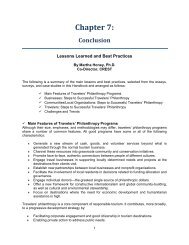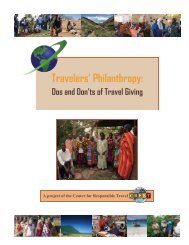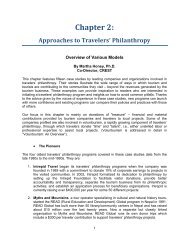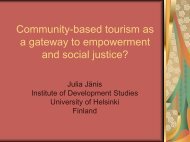Travelers' Philanthropy Handbook - Center for Responsible Travel
Travelers' Philanthropy Handbook - Center for Responsible Travel
Travelers' Philanthropy Handbook - Center for Responsible Travel
You also want an ePaper? Increase the reach of your titles
YUMPU automatically turns print PDFs into web optimized ePapers that Google loves.
community didn’t have what I am giving be<strong>for</strong>e I gave it. Now, hopefully, it will have it. I see thechange – and I believe many local people agree – as a change <strong>for</strong> the better. This isimprovement, development, an element of modernization. In a sense, I am a progressiverevolutionary outsider.Now, because I am an outsider, I am ill-in<strong>for</strong>med and naïve about the local village. I tend tothink of it as a single unit made up of people who get along with each other and have fairlyuni<strong>for</strong>m preferences. As proof, I say, “The local people in this community seem so happy.They smile at me. They laugh a lot even though they are incredibly poor. This is amazing.”But this observation doesn’t prove my point. And my use of the term “community” ismisleading. It implies people in a commune, everybody together, operating as one cooperativeunit.We know that our own society does not operate that way. We have factions, social andeconomic hierarchies, groups with competing ideological beliefs and public policy preferences.Yet, despite this knowledge of ourselves, we tend to idealize “the locals” as being fundamentallydifferent from us and not having these same characteristics. The image of the “noble savage”lives on. But this image is a myth. Inequality exists even in the poorest communities. Everyhuman being lives in a social setting divided by factions, hierarchies, disagreements over valuesand preferences, and personal struggles <strong>for</strong> power and status. Even in what appears to be theidyllic village I want to help, there are some with more wealth, status, power, and influence thanothers. And disagreements over the direction the community should take and over how fast itshould get there.The change I have in mind through mygenerosity could start to shake up thevillage’s stratification system. Let metake an example from areas lackingeasy access to water: digging a welland providing it with a diesel pump.This I see as a public good. Everyonestands to benefit from access to water,particularly if it’s better quality than themuddy river from which villagerscurrently take their supply.For the men in the village, however,Clinic in Niono, Mali. Credit: Masoud.NYCthe well can have a quite differentmeaning. It is going to benefit women more than men. Why? Because fetching water iswomen’s work. They have to walk five miles to the river and bring the water back in gourdsperched precariously on their heads. Men don’t do this. So a benefit perceived by me, theoutsider, as a public good is seen by men, who hold the <strong>for</strong>mal power in the village, as loweringtheir status because women no longer have to carry out this time-consuming, physicallyexhausting task. That I don’t understand and appreciate these views is irrelevant. The tippingof the scales in favor of a disadvantaged group is clearly seen by the advantaged elements inthe village. For them, a well is not an incontrovertibly public good.Moreover, women will soon have more time on their hands because they’re not on their way toand from the distant river. What are they going to do with that time? Perhaps they are going toget together and demand an additional raise in their status. The new well set the precedent <strong>for</strong>182















